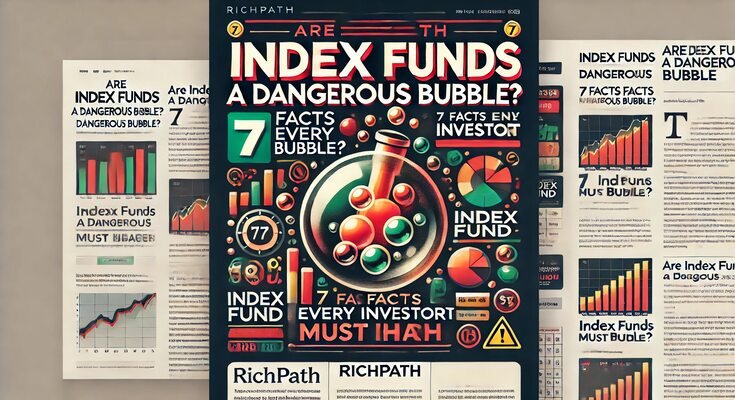Are Index Funds a Bubble? Understanding the Hype and Reality

Investing trends often spark debates, and index funds have found themselves at the center of one. Are index funds a bubble waiting to burst, or are they a reliable, long-term investment option?
In this article, we’ll delve into the rise of index funds, analyze their current state, and explore whether concerns about a bubble are justified.
What Are Index Funds?
Before diving into the bubble debate, let’s understand what index funds are.
Index funds are a type of mutual fund or exchange-traded fund (ETF) designed to replicate the performance of a specific market index, such as the S&P 500 or the Nifty 50.
Benefits of Index Funds:
- Low Cost: Minimal management fees due to passive management.
- Diversification: Spread investments across multiple sectors.
- Simplicity: Ideal for beginners who want exposure to the market.
Real-Life Example:
Anita, a 30-year-old teacher, started investing ₹5,000 monthly in a Nifty 50 index mutual fund. Over 10 years, her portfolio grew significantly, proving the power of long-term investing.
Why Are People Concerned About a Bubble?
1. The Popularity Boom
Index funds have seen explosive growth. In the U.S., for instance, index funds now account for over 50% of all equity investments. This massive shift has sparked fears of overvaluation and herd mentality.
2. Market Distortion
Critics argue that index funds indiscriminately buy all stocks in an index, regardless of valuation. This could lead to inflated prices for companies simply because they are part of the index.
3. Limited Price Discovery
With fewer active managers analyzing individual stocks, some worry about reduced market efficiency.
External Perspective:
A 2023 report by Morningstar highlighted that while passive investing dominates, it still complements active investing, ensuring a balanced market.
Debunking the Bubble Myth
1. Long-Term Stability of Index Funds
Historically, markets have experienced ups and downs, but indices like the S&P 500 and Nifty 50 have consistently delivered solid long-term returns.
Real-Life Example:
Consider Ram, who invested in an index mutual fund tracking the Nifty 50 during the 2008 financial crisis. Despite short-term losses, his investment doubled in value by 2020.
2. Diversification Reduces Risk
Unlike investing in individual stocks, index funds spread risk across multiple companies, reducing the impact of any single stock’s poor performance.
Pro Tip:
Pair index funds with other asset classes, like bonds or gold, to further mitigate risk.
3. No Evidence of Overvaluation
While some stocks in an index may be overvalued, the diversified nature of index funds balances this out. Active investors still play a critical role in price discovery.
External Perspective:
Renowned investor Warren Buffett has repeatedly endorsed index funds, calling them the best option for most people.
Who Should Invest in Index Fund?
Index fund are suitable for:
- Beginners: With little market knowledge.
- Passive Investors: Who prefer a “set it and forget it” approach.
- Cost-Conscious Individuals: Seeking low management fees.
How to Safeguard Against Potential Risks
1. Avoid Overconcentration
While index funds offer diversification, ensure you’re not overly reliant on a single index.
2. Balance with Active Funds
Combine index funds with actively managed mutual funds to leverage professional stock selection.
3. Periodic Review
Regularly assess your portfolio to ensure alignment with your financial goals.
FAQs About Index Funds
1. Are index fund risk-free?
No investment is entirely risk-free. Index fund are subject to market fluctuations, but their diversification reduces risk.
2. Are index fund suitable for short-term goals?
Index fund are best suited for long-term goals due to market volatility.
3. How do I choose the right index fund?
Look for low expense ratios, consistent performance, and alignment with your financial goals.
4. Can index fund outperform actively managed funds?
While active funds can outperform in specific periods, index fund generally provide steady returns over the long term.
5. Is the index fund bubble theory valid?
There’s no concrete evidence to support the bubble theory. Index fund remain a reliable tool for diversified investing.
Conclusion
Index fund have revolutionized investing, offering a simple, cost-effective way to participate in market growth. While concerns about a bubble may arise, the evidence suggests index fund remain a solid choice for long-term investors.
Remember, successful investing isn’t about timing the market; it’s about time in the market.
For more expert insights and resources, visit Rich path.
If this article clarified your doubts about index fund, share it with your friends and family. Got questions or suggestions? Leave a comment below—we’d love to hear from you!
Take control of your financial journey today, and let index fund be your ally in wealth creation!
Read more-



